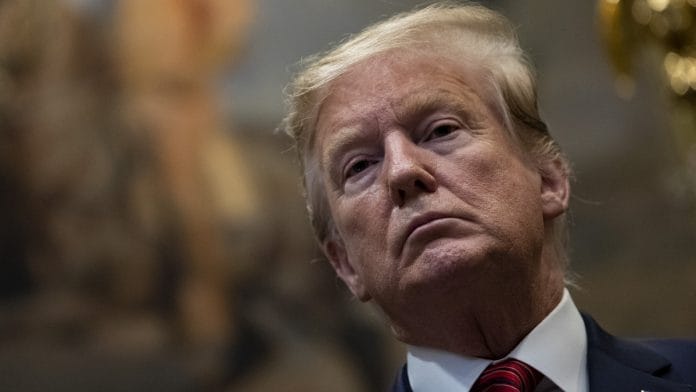US designates IRGC as a ‘foreign terrorist group’
In an unprecedented move, President Donald Trump announced Monday that the US is designating the Iran Revolutionary Guard Corps (IRGC), the country’s military, as a “foreign terrorist group”, reported Al-Jazeera.
This is the first instance of US labelling another country’s military a designated foreign terrorist group.
In the past many, individuals and entities affiliated with the IRGC have been blacklisted by the US, but never the organisation as a whole.
Although it is widely believed that IRGC uses covert mechanisms to intervene in affairs of foreign countries in the region, this holds true for all other major Gulf powers including Saudi Arabia and United Arab Emirates.
Tehran was quick to react to this US escalation, counter-labeling the US and its forces in the region as “state sponsor of terrorism”. But the US decision is likely to cause domestic troubles for Prime Minister Hassan Rouhani backed moderate Iranian government.
The backlash is expected to come from the Iranian hardliners, which include sections of the IRGC leadership. They already accuse Rouhani and other moderates for recklessly reaching out to the West.
However, the US decision is likely to be hailed by Gulf Cooperation Council countries and Israel.
Hong Kong’s ‘Umbrella Movement’ protestors found guilty of public nuisance
Nine of the key protestors, who spearheaded 2014’s Umbrella Movement in Hong Kong, have been found guilty of “public nuisance” charges for participating in mass rallies calling for greater autonomy from China, reported BBC.
Three of the nine charged were prominent activists who were seen as the very faces of the movement back in 2014.
The guilty could face jail up to seven years.
In 2014, several sit-in street protests were conducted demanding Honk Kong’s right to choose its own leader. The wide use of umbrellas by these protestors dubbed the movement as the “Umbrella Movement”.
Earlier, democracy activist and student Joshua Wong was sentenced for three months for contempt of court during the movement.
Anglo-French rivalry comes back to haunt Brexit process
In an unexpected development, French President Emmanuel Macron has emerged as the strongest critic of UK delaying the Brexit process. Taking the harshest stand across all European capitals, Macron has argued for UK to not be given an extension and wrapping up the Brexit process by 12 April.
Many observers see Macron’s move akin to the one made by former French president Charles de Gaulle in 1963, reported the Financial Times. Back then, the UK had applied for European Union’s (then European Economic Community) membership and France had used its veto power to reject the application.
The French president had turned down UK’s application fearing that its inclusion would make the EU an American project. At the time, UK was seen as US’s closest ally in Europe.
Today, the underpinning factors in Europe are much different. Macron doesn’t enjoy the kind of power de Gaulle did. Moreover, France’s position itself in the EU isn’t the same with the rise of Germany.
As of today, the Brexit process looks extremely tedious. But that has little to do with France’s brinkmanship.
In other news
Trump Threatens New EU Tariffs on Helicopters, Motorcycles, Cheese and Wine, Bloomberg
How far can Haftar get with his Tripoli offensive, Al Jazeera
Israel election: PM Netanyahu seeks record fifth term, BBC
Millennials Will Decide Who Runs Indonesia’s Four Trillion-Dollar Economy, Bloomberg
The west Pacific: A new arena of rivalry between China and the US, Financial Times






